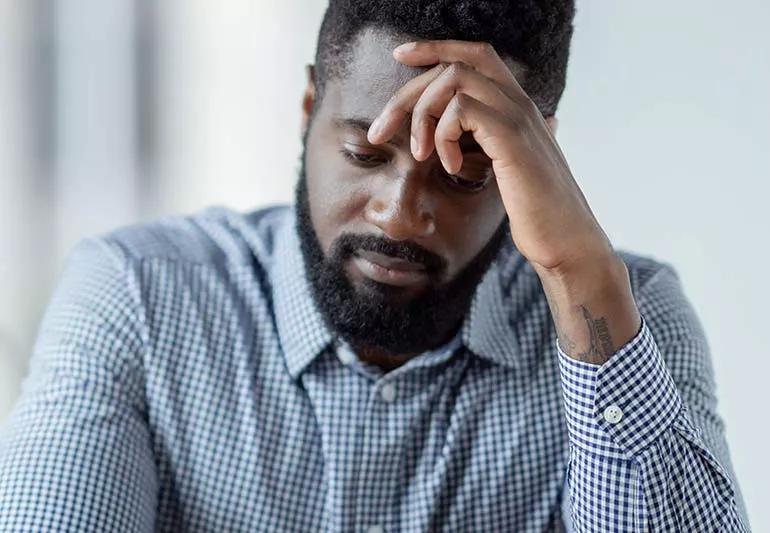Low testosterone levels can mimic symptoms of depression and cause anxiety over time

Image content: This image is available to view online.
View image online (https://assets.clevelandclinic.org/transform/fe312c38-1902-4e41-a78e-9250309521f5/man-depressed-1350731601-770x533-1_jpg)
Man holding head looking worried or depressed.
If you’re experiencing low sex drive, diminishing energy and overall fatigue, you may feel like it’s just another part of getting older. But if you’re a man and you’re experiencing a host of physical symptoms, coupled with a consistent depressive mood, you could actually be dealing with hypogonadism (low testosterone) or undiagnosed depression.
Advertisement
Cleveland Clinic is a non-profit academic medical center. Advertising on our site helps support our mission. We do not endorse non-Cleveland Clinic products or services. Policy
But figuring out whether you’re dealing with depression or low testosterone is tricky and requires further examination from a healthcare provider. Urologist Lawrence Hakim, MD, explains more about the connection between low testosterone and your mood, and how these conditions may be related.
Androgens, including testosterone, are the hormones that give people their “male” and “female” characteristics. They also play a critical role in puberty, the development of your sexual reproductive system and your ability to reproduce.
You can think of all hormones, including androgens, like switches on a circuit board: When the production of these hormones are turned on or off, different things happen. You can experience physical, mental and emotional changes whenever production of these hormones increase, decrease or stop completely. The severity of these changes can vary widely from one hormone to the next, and these changes don’t happen in a vacuum. When the levels of one hormone changes, others may change in response. An increase in one hormone might mean a decrease in others. And when you have these hormonal imbalances, it can cause a variety of conditions to develop.
Testosterone levels tend to decrease normally as you get older, but they can also fluctuate for many reasons. Studies show these changes in testosterone can impact your mood in different ways. And these changes can occur in response to many different factors, including stress, lack of sleep, changes in your diet, aging and increasing or decreasing your physical activity.
Advertisement
If your testosterone levels are too high, for example, you may feel irritable or quick to anger. In comparison, low testosterone can make you feel extremely tired, depressed, weak or low in energy.
“People with hypogonadism, or low testosterone, will often say they have no energy, no desire for sexual activity and that they noticed a decrease in muscle mass,” says Dr. Hakim.
“In fact, hypogonadism is often associated with increased fat mass and reduced muscle mass, which can lead to obesity and other health risks, including cardiovascular disease. Those are all common signs and symptoms that may be associated with low testosterone.”
Low testosterone and depression share a lot of the same symptoms, including:
“When we say people are depressed, what are we describing? We’re often describing someone as having low energy and no desire to partake in activities that normally bring them pleasure — these are common things we see with low testosterone, too,” notes Dr. Hakim. “Sometimes, people are actually misdiagnosed with clinical depression and they might instead have low testosterone or hypogonadism. It is therefore important to rule-out a physical cause of the condition, such as hypogonadism, prior to treatment.”
Various physical symptoms may be associated with either depression or low testosterone. People who have depression might complain of back pain or neck pain, but might not experience other symptoms typically associated with low testosterone that include:
And if you also have depression or even an anxiety disorder, your symptoms may worsen over time if low testosterone levels are leading to a further decline in sexual performance and libido.
“If you come in to see your doctor with any of these symptoms, especially if you have some form of sexual dysfunction, it is important to evaluate your total and free testosterone levels, since hypogonadism may be the underlying cause,” advises Dr. Hakim. “You don’t want to ignore low testosterone. You want to address it as well as look for any other underlying diagnosis that needs to be addressed.”
If you’re experiencing physical symptoms like sudden weight gain or decrease in your sex drive or sexual performance and other mental and emotional symptoms, you should talk to a doctor about testing your testosterone levels. There are many effective treatment options to restore your testosterone levels to the normal range, if your testosterone levels are abnormally low. But even if you discover you don’t have low testosterone levels, understanding those test results will often provide some reassurance and help your healthcare provider better understand and manage your symptoms.
Advertisement
“Many of these symptoms, especially as men get older, can be due to other factors such as stress, anxiety, pressure, work, aging, relationship issues and even other medications,” says Dr. Hakim. “Ultimately, a multispecialty approach is important to assure the best outcomes and patient satisfaction.”
Advertisement

Sign up for our Health Essentials emails for expert guidance on nutrition, fitness, sleep, skin care and more.
Learn more about our editorial process.
Advertisement
Testosterone therapy may be an option for women to help address low libido
Symptoms are subtle, but could include a reduced libido and mood swings
Vasectomies and masturbation don't lower your testosterone levels
Lifestyle choices are often a contributing factor for low-T
Low T can decrease fertility, but there is hope
Over-the-counter supplements aren’t the answer
OTC meds, rest, fluids and an anti-inflammatory diet can help you get through big and small weather changes
A variety of factors can cause temporary or more lasting changes in penis length
Although it could be used as a moisturizer, this new trend is not recommended
Communicating clear limits helps protect your time, energy and emotional well-being
High cholesterol can be genetic, but testing and treatment can lower your heart disease risk